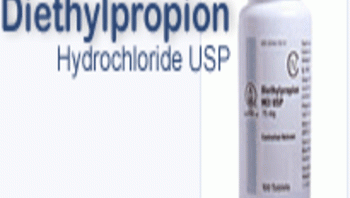WEIGHT LOSS PILL TYPE: Diethylpropion is an Appetite suppressant, sympathomimetic (causes a rise in blood pressure and a slowing of the heart rate), and central nervous system stimulant. It hasbeen approved for weight management by the Food and Drug Administration in 1959 and is a schedule IV controlled substance, with low potential for abuse.
SOLD AS: Diethylpropion is available as 25-mg tablets (immediate release) and 75-mg tablets (sustained release). ‘
RESEARCH: In a double-blind, placebo-controlled study, patients taking diethylpropion hydrochloride lost an average: of 1.32 pounds per week compared with patients on placebo, who lost 0.84 pounds per week. At the end of the 12-week study, those who had taken diethylpropion lost an average of 15.9 pounds compared with 10.0 pounds for those taking placebo. The researcher noted that “amphetamine-like side effects were virtually absent.” However, amphetamine-like side effects, commonly associated with this drug.
The conclusions were comparable in another double-blind, placebocontrolled study. Scientists in New Zealand found that patients who took diethylpropion had considerably more weight loss than those who took placebo and that the side effects gone through by the drug-treated group were not drastically greater than those suffered by participants in the placebo group.
WHAT IS IT SUPPOSED TO DO: Diethylpropion stimulates the satiety (feeling of -fullness) center in the hypothalamus and limbic regions of the brain, where ‘appetite and hunger are controlled. Because diethylpropion has amphetamine-like qualities, it has the possibility to result in psychological dependency. This product can be efficient as a weight-loss agent if it is used in addition to a lowcalorie diet, behavior modification, and a routine workouts program. Nevertheless, weight loss may be only temporary, especially after the drug is discontinued. To maintain weight loss or to continue to lose additional weight after stopping diethylpropion, it is necessary to follow a sensible eating plan and an exercise program.
HOW TO TAKE IT: Diethylpropion is indicated for shortterm use (no longer than 12 weeks) for treatment of exogenous obesity (obesity caused by excess intake of calories). It is not indicated for cosmetic weight loss. If you are younger than sixty years, take a 25-mg immediate release tablet 3 times daily 1 hour before meals. For the sustained release, take a 75-mg tablet 10 to 14 hours before bedtime. If you are sixty years or older, you may need to reduce the dosage. Consult with your physician before you start taking this drug. Do not give to children younger than 12 years. If you miss a dose, take the missed dose as soon as possible unless it is nearly time for your next one. In that case, skip the missed dose and continue with your regular schedule.
SIDE EFFECTS: Common side effects include irritability and insomnia. Less common ones include anxiety; blurred vision; changes in libido; dry mouth; dysphoria (mood of restlessness, dissatisfaction, unhappiness; dizziness; euphoria; headache; hypertension; irregular or pounding heartbeat; nausea or vomiting; rash; sweating; and tremor.
PRECAUTIONS: Dierhylpropion should not be used by individuals who are allergic to the drug or by those who have a history of arteriosclerosis or hardening of the arteries; glaucoma; high blood pressure; cardiovascular disease; pulmonary hypertension; hyperthyroidism; alcohol or drug abuse; arrhythmias; kidney or thyroid disease; mental illness; or epilepsy. In particular, diethylpropion can dramatically increase blood pressure and the risk of stroke when combined with phenelazine (Nardil), tranylcypromine (Parnate), or furazolidone (Furazolidone).
Diethylpropion also should not be taken by individuals who have taken medicines of the MAO inhibitor class within the last 2 weeks or an anorectic substance within the last year. If you are getting any of these substances, consult your doctor before starting diethylpropion: amantadine; amphetamines; any medications for hyperactivity; any appetite-control drugs; chlophedianol; asthma medications, prescription or OTe decongestants or antihistamines; methylphenidate; nabilone; and pemoline. Do not take any other type of anorectic substance, including prescription, over-the-counter, or herbal product while taking diethylpropion. Avoid all foods, beverages, and medications that contain caffeine while taking diethylpropion. Inform your physician and dentist that you are taking diethylpropion before you undergo any type of treatment.
Diethylpropion has the potential to be addictive. If tolerance develops, gradually discontinue use while under the supervision of your doctor. Do not operate a motor vehicle or heavy machinery when taking this drug if you feel drowsy.
This drug should not be taken for longer than 3 months.
Longer use has been connected with a rise in the potential risk of building pulmonary hypertension, a rare but fatal illness.
No satisfactory reports have been done in pregnancy, consequently avoid using diethylpropion if you are pregnant or think you could be. Weight loss during pregnancy, even for obese persons, is not suitable as it can harm the fetus. It’s not at all established if diethylpropion is secreted in breast milk, thus it is most beneficial not to use this drug while breast-feeding.
Diethylpropion, like other appetite suppressants, often causes dry mouth, which can increase the chance of developing gum disease and dental cavities. Special attention to oral hygiene, including use of sugarless gum and sugarless hard candies, or sucking on ice chips, is recommended while taking these drugs.
